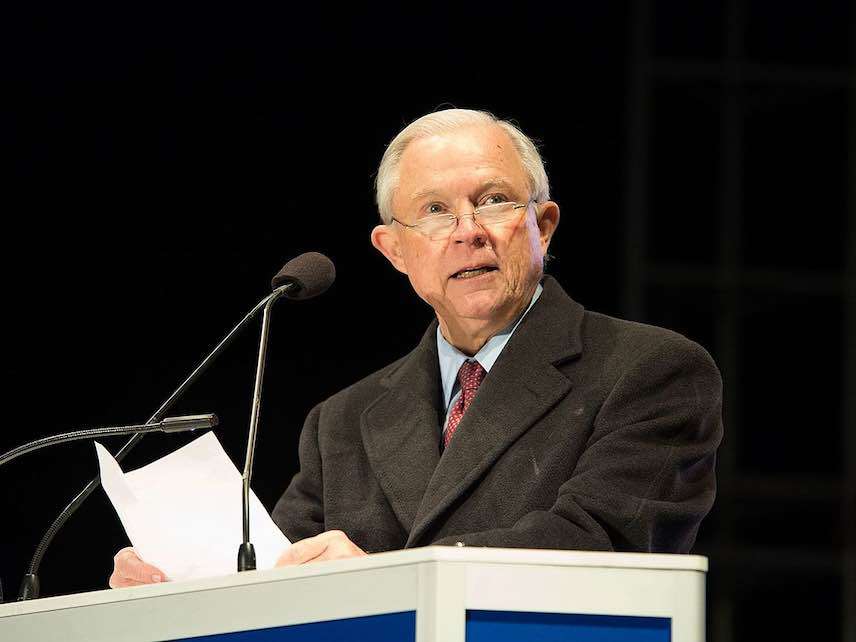The Justice Department Is Asking Legal Marijuana States to Do the Impossible
Sessions wants Washington Gov. Jay Inslee to do something that can't be done.

We've been waiting months for the Justice Department to announce its plans for recreational marijuana markets in states that legalized the drug contra federal law. Yesterday, HuffPost published a letter from Attorney General Jeff Sessions to Washington Gov. Jay Inslee that provides some (but not much) clarity.
In a letter dated July 24, Sessions asks Inslee to "please advise as to how Washington plans to address" a 2016 report from the Northwest High Intensity Drug Trafficking Area that claimed Washington has failed to comply with the eight enforcement priorities laid out in the "Cole memorandum," issued by Pres. Obama's Justice Department in August 2013 and named for Deputy Attorney General James Cole.
To recap, the Cole memo stated that post-legalization in Colorado and Washington, federal law enforcement agencies remained committed to:
- Preventing the distribution of marijuana to minors
- Preventing gangs and organized crime from profiting off marijuana sales
- Preventing states that had legalized marijuana from exporting the drug to other states
- Preventing marijuana vendors in legalization states from engaging in other illegal activities or working with other illegal drugs
- Preventing violence in the cultivation of marijuana
- Preventing drugged driving
- Preventing marijuana grows on public land
- Preventing marijuana use and distribution on federal land
The 2016 NW HIDTA report Sessions references found that Washington has been unable to realize several preventions: marijuana cultivated in Washington has been found in 43 other states; 90 percent of Washington's recreational industry's public safety violations in the first year of legalization involved either sale to minors or employment of minors in the marijuana industry; drugged driving has increased substantially; and state regulators have had difficulty keeping track of all marijuana produced in the state.
Sessions instructs Inslee to "please advise as to how Washington plans to address the findings in the Northwest HIDTA report, including efforts to ensure that all marijuana activity is compliant with state marijuana laws, to combat diversion of marijuana, to protect public health and safety, and to prevent marijuana use by minors."
HuffPost's Matt Fermer spoke to government officials in both Washington and Oregon who say they're doing everything they can to address those issues. Colorado has since day one made discouraging teen use and prosecuting diversion a priority.
Governors from those three states, and Alaska, recently sent a letter to Sessions explaining they are "committed to implementing the will of our citizens and have worked cooperatively with our legislatures to establish robust regulatory structures that prioritize public health and public safety, reduce inequitable incarceration and expand our economies."
It's not as if they're taking this whole "legal pot" thing lightly. But it's likely they know, and Sessions likely knows, carrying out fully Cole's enforcement priorities is an impossible task. Laws themselves will not eradicate forbidden behaviors. Laws discourage those behaviors and punish people who engage in them.
Alcohol is tightly regulated across the country, yet 60 percent of 18-year-olds have reported trying alcohol at least once. Is that evidence of negligence or carelessness on the part of state regulators? Of course not.
The same goes for diversion of marijuana. Marijuana from Colorado and Washington travels far and wide. But this has been the case since California passed the first state medical marijuana law in 1996. Laws against diversion don't prevent diversion, they simply allow states to punish people who divert. People have trafficked cigarettes from the southeast U.S. to high-tobacco-tax states in the northeast for years, yet the DOJ is not sending ominous letters to Virginia or North Carolina.
Jacob Sullum and I have both written about the challenge of assessing drugged driving impairment in marijuana users. The National Institute for Drug Abuse (NIDA) recently acknowledged that "current testing methods do not necessarily accurately reflect impairment." The Rocky Mountain High Intensity Drug Traffic Area has admitted that finding THC in a driver's blood after an accident "does not necessarily prove that marijuana was the cause of the incident." NIDA recently issued a request for proposals for a better system for detecting and measuring marijuana impairment.
Does Sessions think Washington can simply conjure that technology out of thin air?
We don't yet know what Sessions has planned for federal marijuana enforcement, because his task force has yet to publish its recommendations. But if this letter to Gov. Inslee is any indication, he might be planning to ask legal marijuana states to meet an impossible goal.


Show Comments (31)